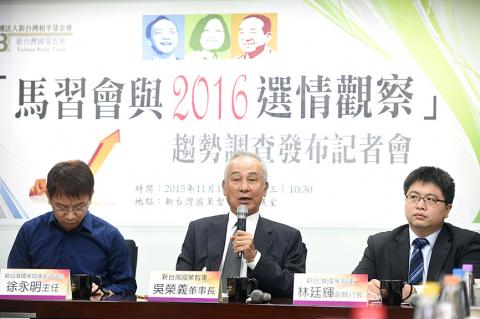The meeting between President Ma Ying-jeou (馬英九) and Chinese President Xi Jinping (習近平) earlier this month damaged support for the Chinese Nationalist Party (KMT) and boosted negative perceptions of China, especially among young people, a poll released yesterday showed.
Although most KMT politicians have described the Ma-Xi meeting as a positive move, a poll conducted by the Taiwan Brain Trust think tank indicated that the meeting led to a decreased approval rating of the party among pan-blue supporters.
According to the poll, the approval rating for the KMT dropped 1.2 percent from 20.8 percent in September to 19.6 percent, while the Democratic Progressive Party’s (DPP) approval rating showed a 0.3 percent drop from 42.3 percent to 42 percent.

Photo: George Tsorng, Taipei Times
However, the DPP’s disapproval rating dropped from 45 percent in September to 37.7 percent, making it the first time this year that the party’s approval rating surpassed its disapproval rating, the poll showed.
“The Ma-Xi meeting was the first time the leaders of Taiwan and China met,” Taiwan Brain Trust executive director Lee Ming-chun (李明峻) told a news conference. “The KMT’s approval rating dropped after the meeting, especially among pan-blue supporters, which went from 49.3 percent [in September] to 47 percent this time, showing that there are still anti-Communist pan-blue supporters who are disappointed by the Ma-Xi meeting.”
Although the Ma administration has worked over the past seven years to enhance the cross-strait relationship, 39.2 percent said they have a negative perception of China, with only 15.9 percent expressing a positive perception of the nation, while 36.1 percent said they have “no feelings” toward China, the poll showed.
The percentage having a negative perception of China went up by 1.9 percent from 37.2 percent in September, before the Ma-Xi meeting, while respondents who indicated “no feelings” dropped by 2.4 percent from 38.5 percent, it showed.
Those with a positive perception of China dropped by 2.8 percent from 18.7 percent, it showed.
In addition, 66.7 percent of respondents said that Taiwan is a sovereign and independent nation, while only 21.8 percent disagreed with the assertion, the poll showed.
In response to the question of whether Taiwan should become an independent nation or unify with China, 61.4 percent supported independence, while 12.3 percent opted for unification, the results showed.
As for self-identity, 87 percent of respondents identified themselves as “Taiwanese,” while 6.1 percent considered themselves “Chinese,” it said.
The poll indicated that people aged from 20 to 29 are notably more pro-independence than other age groups, with 81.9 percent of respondents in their 20s saying Taiwan should become an independent nation.
Ninety-eight percent of those in that age group identified themselves as “Taiwanese.”
The results showed that DPP presidential candidate Tsai Ing-wen (蔡英文) has 48.4 percent support, the KMT’s Eric Chu (朱立倫) has 20.4 percent, while the People First Party’s James Soong (宋楚瑜) has 9.3 percent ahead of Jan. 16’s election.
The poll was conducted on Friday and Saturday last week, with 1,108 valid samples collected.
It has a margin of error of 2.9 percentage points.

The manufacture of the remaining 28 M1A2T Abrams tanks Taiwan purchased from the US has recently been completed, and they are expected to be delivered within the next one to two months, a source said yesterday. The Ministry of National Defense is arranging cargo ships to transport the tanks to Taiwan as soon as possible, said the source, who is familiar with the matter. The estimated arrival time ranges from late this month to early next month, the source said. The 28 Abrams tanks make up the third and final batch of a total of 108 tanks, valued at about NT$40.5 billion

Two Taiwanese prosecutors were questioned by Chinese security personnel at their hotel during a trip to China’s Henan Province this month, the Mainland Affairs Council (MAC) said yesterday. The officers had personal information on the prosecutors, including “when they were assigned to their posts, their work locations and job titles,” MAC Deputy Minister and spokesman Liang Wen-chieh (梁文傑) said. On top of asking about their agencies and positions, the officers also questioned the prosecutors about the Cross-Strait Joint Crime-Fighting and Judicial Mutual Assistance Agreement, a pact that serves as the framework for Taiwan-China cooperation on combating crime and providing judicial assistance, Liang

A group from the Taiwanese Designers in Australia association yesterday represented Taiwan at the Midsumma Pride March in Melbourne. The march, held in the St. Kilda suburb, is the city’s largest LGBTQIA+ parade and the flagship event of the annual Midsumma Festival. It attracted more than 45,000 spectators who supported the 400 groups and 10,000 marchers that participated this year, the association said. Taiwanese Designers said they organized a team to march for Taiwan this year, joining politicians, government agencies, professionals and community organizations in showing support for LGBTQIA+ people and diverse communities. As the first country in Asia to legalize same-sex

MOTIVES QUESTIONED The PLA considers Xi’s policies toward Taiwan to be driven by personal considerations rather than military assessment, the Epoch Times reports Chinese President Xi Jinping’s (習近平) latest purge of the Chinese People’s Liberation Army (PLA) leadership might have been prompted by the military’s opposition to plans of invading Taiwan, the Epoch Times said. The Chinese military opposes waging war against Taiwan by a large consensus, putting it at odds with Xi’s vision, the Falun Gong-affiliated daily said in a report on Thursday, citing anonymous sources with insight into the PLA’s inner workings. The opposition is not the opinion of a few generals, but a widely shared view among the PLA cadre, the Epoch Times cited them as saying. “Chinese forces know full well that